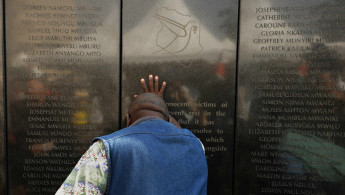US Supreme Court orders Sudan to pay over $4 billion over al-Qaeda bombings
The US Supreme Court has sided with the victims of the 1998 al-Qaeda embassy bombings, ordering Sudan to pay out more than $4 billion in compensation.
3 min read
The embassy bombings claimed 324 lives [Getty]
The US Supreme Court has ruled that Sudan must dish out more than $4 billion in compensation to the victims of two al-Qaeda bombings.
Eight justices of the court on Monday agreed to reverse a 2017 ruling arguing that Sudan was immune from litigation in the United States, local media reported.
The verdict leaves the Sudanese government with $4.3 billion in punitive damages to pay out to the survivors and family members of victims of the 1998 al-Qaeda embassy bombings in Kenya and Tanzania.
The devastating truck bombs that were detonated simultaneously outside the two US embassies on 7 August 1998 marked the first large-scale attack by the extremist group.
In Nairobi, 213 people were killed, with another 11 lives claimed in Dar es Salaam. Twelve US citizens were among the dead and thousands more injured. Al-Qaeda would go on to carry out the September 11 attacks in the US just three years later, killing nearly 3,000 people.
Sudan is accused of complicity in the embassy attacks and the 2000 bombing of the USS Cole due to the harbouring of al-Qaeda leader Osama bin Laden by the country's former dictator, Omar al-Bashir.
Twitter Post
|
Allegations that Khartoum provided support to the extremist group landed Sudan on the US State Sponsors of Terrorism list in the 1990s, a designation that continues to limit its access to international aid.
Groups of plaintiffs representing the victims and their families began to sue Sudan in US courts in 2001.
While US law generally bars claims against foreign countries, a federal judge was able to find Sudan liable for $10.2 billion in damages due to its place on the State Sponsors of Terrorism list.
Critics of the case in Sudan and elsewhere have cast doubt on Khartoum's complicity in the bombings which occurred two years after bin Laden was expelled from the country.
In February, the Supreme Court heard arguments that it should reverse a 2017 lower court ruling that blocked victims of the attacks from receiving punitive damages.
The 2017 ruling had argued that the initial verdict had relied on the retroactive application of a 2008 law and was thus invalid.
The Supreme Court on Monday ruled that the law, which allowed victims of terrorist attacks to sue foreign nations, could be applied retroactively in this case.
Ties between Khartoum and Washington have warmed since a transitional government took the place of Bashir last year.
As part of efforts to be removed from the State Sponsors of Terrorism list, Khartoum reached a settlement earlier this year with the families of the 17 victims of the USS Cole attack.
Sudan will not be removed from the list until it fulfils its obligations towards compensation, US have officials have said.
Previous statements by Sudanese officials indicate that the transitional government - some $60 billion in debt and still mired in economic crisis stoked under Bashir and exacerbated by the coronavirus crisis - may hope to negotiate the settlement down to a smaller and more manageable sum.
Follow us on Facebook, Twitter and Instagram to stay connected





 Follow the Middle East's top stories in English at The New Arab on Google News
Follow the Middle East's top stories in English at The New Arab on Google News
![Netanyahu furiously denounced the ICC [Getty]](/sites/default/files/styles/image_330x185/public/2024-11/GettyImages-2169352575.jpg?h=199d8c1f&itok=-vRiruf5)
![Both Hamas and the Palestinian Authority welcomed the ICC arrest warrants [Getty]](/sites/default/files/styles/image_330x185/public/2024-11/GettyImages-2178351173.jpg?h=199d8c1f&itok=TV858iVg)
